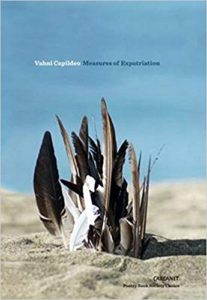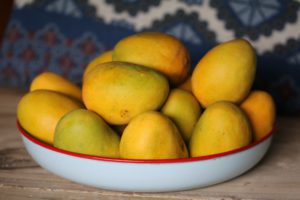Sneha Alexander recently completed an MA in Postcolonial Studies MA at SOAS University of London. Her interests include queer feminist theory and praxis, Britain’s racial politics and world literature.
The “[M]other tongue is an evil myth”: Multiple Languages in Vahni Capildeo’s Measures of Expatriation

Measures of Expatriation (2016) Vahni Capildeo, from Carcanet Press [https://bit.ly2R5RApM]
In fact, Capildeo stands firmly by the notion that no one speaks a single language and that linguistic multiplicity is present even in monoglot societies. She notes the varied “language[s] of commerce, or fishing, or gravity and swearing” [4] which, she claims all have individual linguistic histories. Capildeo’s fascination with multiplicities within a language is echoed by one of her narrators who speaks of the “fluidity and zigzagging of Trinidadian speech” with histories of “Sanskrit and the formality of the older Christian (mostly Catholic) liturgies” mixed with the “tricksy shrug and bread-and-curses everydayness of Spanish-French-Portuguese-Syrian-Chinese–Scottish-Irish-(English)” (Measures of Expatriation IV: 101). The breathless rapidity of Capildeo’s prose poem not only invokes the idea of multiple languages but also brings together the shadows of specific geographies associated with them. Capildeo consistently foregrounds the interconnections between places and the languages that fill them; reiterating that there is no such thing as purity, linguistic or otherwise.
In Measures of Expatriation, Capildeo places one language beside another, teasing out the gaps between meanings. The narrator of the titular poem muses:
“Exile is flattened in English. Exil in French is yet more clipped: exil is a short step from death; […] Exilio, esilio is one to call from mountaintops” (Measures of Expatriation VI: 102)
Capildeo emphasises the loss and longing surrounding the word “exile” in all of these languages. It is a perpetual cry, a “call from mountaintops” (Measures of Expatriation VI: 102), lonely and alone. However, when she returns to English, Capildeo riffs on the chasms that open up from formalised terminologies.
“Expatriate.
Exile.
Migrant.
Refugee.” (Measures of Expatriation VI: 101)
Capildeo recognises that even as languages can be fluid and transcendent, they are also construed as bordered entities. In the poem, the difference between these four words in English is far greater than translations of the word “exile”. Capildeo notes the “asymmetry” between “Expatriate./ Exile./ Migrant./ Refugee.” (Measures of Expatriation VI: 101), cordoning them off between full stops to demonstrate “that these words are not synonyms”.[5]
However, Capildeo is keen not to overemphasize this aspect of the book, instead referring to Measures of Expatriation as a series of “excavations of time and place”.[6] The poems move from musings on a sixteenth century hawking glove to the poet’s own experiences of border guards denying her re-entry to the UK. Nevertheless, echoes of longing and questions of belonging permeate the collection. In “Too Solid Flesh”, the narrator attempts to read on an English train, hoping that “Reading could fix me. It could be a way to acquire weight” (Too Solid Flesh: 24). Instead, the narrator opens a book “and a mango fell out” (Too Solid Flesh 24) and another, and another.
“These were newly published books: fresh leaves.
“Woman doth not live by mango alone. ” (Measures of Expatriation)
Was there more goodness in volumes of essays or in novels” (Too Solid Flesh: 24).
When the narrator visits the marketplace she is told to sell her mangoes by an “agent with half a face” (Too Solid Flesh: 25). Capildeo takes issue with the “marketing and identity politics”[7] directed at writers of colour in the UK which she found were “combining to crush […] the body, the voice of the page, the biography, the history”[8] into a single, sellable identity without contradiction or multiplicity.
Capildeo also riffs on canonical works, adding multiple tongues and spirals of linguistic possibility. In “Sycorax Whoops“, Caliban’s voice (from Shakespeare’s character in The Tempest) is half-erased by way of crossed-out text which, when read, reveals sparkling and uncompromisingly angry wordplay. The poem’s epigraph is taken from a speech where a respectable character imagines a utopian commonwealth and Capildeo, noting the irony, gives her poem to Caliban – whose island is taken over by invaders. Capildeo allows Caliban to exercise a kind of linguistic power when he calls up a “pack of languages, fluid as hounds,” (Sycorax Whoops: 121); an inversion of the “divers Spirits, in shape of dogs and hounds” (The Tempest 4.1) that are conjured up to terrorise Caliban in Shakespeare’s play.
“Mother! plunge your tongue where ever with brokenness we’re deaf
en’d defend fed. Take apart our part. Launch in sighted
darkness our pack of languages, fluid as hounds,
all ready: bathed: riteful: already intending chase:” (Sycorax Whoops: 121).
Caliban rages against the “brokenness” that comes when he is “deaf/ en’d” by a language that is imposed on him by his colonizers. The crossed-out words in the poem imply both silencing of a tongue and resilience (as the words can still be read). In this poem, multiple languages are present and eager, almost vengefully intending chase.
Capildeo’s book, Measures of Expatriation, is suffused with multiple languages and multiplicity thrives in her poems. One narrator affirms that: “Language is my home, I say; not one particular language”. (Measures of Expatriation III: 101). Perhaps, for Capildeo also, multiple languages will always be the definition of home.
Notes
[1] Sutcliffe, Tom. Interview with Edward Dusinberre, Marianne Clement, Diego Marani and Vahni Capildeo. BBC Radio 4, podcast audio, 1st February 2016
[2] All quotations from podcasts are my transcription
[3] Parmar, Sandeep. The Wolf Magazine, issue 34 [http://www.wolfmagazine.co.uk/images/Vahni-interview.pdf][4] Sweet, Matthew. Interview with director Alvin Rakoff, Ryan Danes, Graeme Burk and Vahni Capildeo. BBC Radio 4, podcast audio, 29th June 2017
[5] Sutcliffe, Tom. Interview with Edward Dusinberre, Marianne Clement, Diego Marani and Vahni Capildeo. BBC Radio 4, podcast audio, 1st February 2016
[6] Sweet, Matthew. Interview with director Alvin Rakoff, Ryan Danes, Graeme Burk and Vahni Capildeo. BBC Radio 4, podcast audio, 29th June 2017
[7] Sutcliffe, Tom. Interview with Edward Dusinberre, Marianne Clement, Diego Marani and Vahni Capildeo. BBC Radio 4, podcast audio, 1st February 2016
[8] Sutcliffe, Tom. Interview with Edward Dusinberre, Marianne Clement, Diego Marani and Vahni Capildeo. BBC Radio 4, podcast audio, 1st February 2016
Read
Capildeo, Vahni. 2016. Measures of Expatriation (Manchester: Carcanet Press)
Capildeo, Vahni. 2016. Handfast, from Measures of Expatriation (Manchester: Carcanet Press)
Capildeo, Vahni. 2016. Sycorax Whoops, from Measures of Expatriation (Manchester: Carcanet Press)
Watch
T.S. Eliot prize. “Vahni Capildeo reads from “Measures of Expatriation””. Posted 27th Jauary 2017. YouTube video. Duration 11:55.
Listen
Sutcliffe, Tom. Interview with Edward Dusinberre, Marianne Clement, Diego Marani and Vahni Capildeo. “Start the Week: Languages and Reinvention” BBC Radio 4, podcast audio, 1st February 2016.
Sweet, Matthew. Interview with director Alvin Rakoff, Ryan Danes, Graeme Burk and Vahni Capildeo. “Arts and Ideas: Free Thinking” BBC Radio 3, podcast audio, 29th June 2017



Leave a Reply